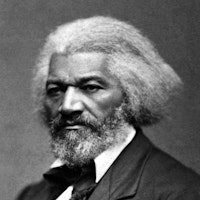[Lincoln was] the architect of his own fortune, and the American people… saw in him, a full-length portrait of themselves. In him they saw their better qualities represented, incarnated and glorified – and as such they loved him.
Lincoln was the architect of his own fortune, and the American people… saw in him, a full-length portrait of themselves. In him they saw their better qualities represented, incarnated and glorified—and as such they loved him.
Frederick Douglass

A Full Length Portrait
Topic: Society & Civil Religion
A few months after Lincoln’s assassination, Frederick Douglass remarked that Lincoln was “the architect of his own fortune, and the American people, indebted to themselves for themselves, saw in him, a full-length portrait of themselves. In him they saw their better qualities represented, incarnated and glorified—and as such they loved him.”
Frederick Douglass (c. February 1818 – February 20, 1895) was an African-American social reformer, abolitionist, orator, writer, and statesman. After escaping from slavery in Maryland, he became a national leader of the abolitionist movement in Massachusetts and New York, gaining note for his oratory and incisive antislavery writings. In his time, he was described by abolitionists as a living counter-example to slaveholders' arguments that slaves lacked the intellectual capacity to function as independent American citizens. Northerners at the time found it hard to believe that such a great orator had once been a slave.
Martin, Waldo E. The Mind of Frederick Douglass, p. 265 [Waldo E. Martin Jr. (University of North Carolina Press, 1984)].

Frederick Douglass
Theme: A Vision of America

About This Frederick Douglass Quotation [Commentary]
Frederick Douglass’s tribute to Abraham Lincoln, spoken months after the assassination, recognizes Lincoln as “the architect of his own fortune.” With these words, Douglass points to a life shaped by discipline and moral direction rather than status or inheritance. Lincoln’s ascent was not the product of privilege but of deliberate effort. For Douglass, this quality carried deep meaning: the idea that a person—and a nation—could be shaped through conscience and conviction. Lincoln became a figure formed by inner resolve, and in that formation, Douglass saw a reflection of what the American project might yet become.
Douglass then observes that “the American people… saw in him, a full-length portrait of themselves.” This is not flattery but a precise recognition of how Lincoln came to represent the public’s self-understanding. The people, “indebted to themselves for themselves,” identified in Lincoln their “better qualities represented, incarnated and glorified.” These words, carefully chosen, suggest that Lincoln stood not above the people but as an image of who they hoped to be—honest, fair, and steady in principle. His life did not flatter the public’s lower instincts but gave form to their higher ones.
Frederick Douglass’s reflection speaks to a vision of America rooted in responsibility and self-recognition. Though Douglass had long urged the nation toward a more urgent moral course, his words here are clear: Lincoln became beloved because the people saw in him their “better qualities.” The portrait Douglass paints is both a recognition and a challenge—a reminder that the greatness seen in one leader must also be cultivated in the people who choose to see themselves in such a mirror.
Frederick Douglass on Lincoln’s “House Divided” Speech
In the 1850s, Frederick Douglass and Abraham Lincoln—two giants on the stage of American history—embarked on paths that would converge on the issue of slavery. On June 16, 1858, Lincoln’s “House Divided” speech proclaimed that the nation could not survive half slave and half free. While both Douglass and Lincoln, inspired by the ideals of liberty and equality enshrined in the Declaration of Independence, agreed that slavery was immoral, they disagreed on the best method to abolish the institution. Frederick Douglass had become convinced that the Constitution was anti-slavery, but Lincoln insisted that the document did not authorize Congress to abolish the institution in the South. The most that the federal government could do, in Lincoln’s judgment, was to prevent slavery’s extension into new territories. Lincoln hoped that, confined to the South, slavery would die a natural death. While Lincoln was convinced that preserving the Union was more important than abolishing slavery, Douglass believed that a Union with slavery was an unacceptable betrayal of the nation’s democratic ideals.
–Waldo E. Martin Jr. [The Mind of Frederick Douglass, p. 265 (University of North Carolina Press, 1984)].
Commentary by Elizabeth Cady Stanton
When Douglass died on February 20, 1895, the reformer Elizabeth Cady Stanton, who knew him since the 1840s and with whom he made common cause supporting women’s rights, paid him eloquent tribute in her diary. Stanton never forgot the first time she saw Douglass speak: “He stood there like an African prince, majestic in his wrath. Around him sat the great antislavery orators of the day, earnestly watching the effect of his eloquence on that immense audience, that laughed and wept by turns, completely carried away by the wondrous gifts of his pathos and humor. On this occasion, all the other speakers seemed tame after Frederick Douglass.”
—James A. Colaiaco [Frederick Douglass: A Life and Times posted on The History Reader blog, February 1, 2016].
Additional Frederick Douglass Quotes
Resources
Related Quotes
Copyright © 2017 – 2026 LuminaryQuotes.com About Us